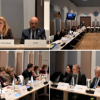News
Displaying Results 1 - 25 of 156
The raw materials sector is at the forefront of global challenges and opportunities of the 21st century, as it plays a vital role in the energy, transport, and digital transitions required to mitigate and adapt to climate change. However, the sector also faces significant pressures from consumers,…
At the World Economic Forum Annual Meeting in Davos, UNECE Executive Secretary Tatiana Molcean highlighted the role of UNECE’s legal instruments, standards and tools in dealing with the most pressing global challenges, namely climate change, digital and green transformations, low-carbon energy…
Originally introduced in policy and development discussions in 2011, the water-food-energy-ecosystem nexus approach has evolved into a pivotal framework for sustainable development and achieving the Sustainable Development Goals (SDGs).
Work on the water-energy-food-ecosystems nexus under the…
As the international community marks 75 years since the adoption of the groundbreaking Universal Declaration of Human Rights, UNECE calls for commitment and practical measures from governments and all stakeholders in the region to uphold the human rights of all persons including those with…
UNECE and partners are working together to support North Macedonia in its green energy transition by building capacities to finance energy efficiency (EE) and renewable energy (RE) projects.
To this end, UNECE and UNDP organized two training sessions on design and verification of energy…
As countries seek to rapidly decarbonize their economies, investing in energy efficiency and the improved performance of buildings offers significant near term gains. Available measures can help transform the building and construction sector, which today is responsible for approximately 40% of…
The European Commission has proposed a new legislation, the European Critical Raw Materials Act, to ensure a secure and sustainable supply of critical raw materials for the EU. The Act, on which the European Parliament and the European Council reached a provisional agreement on 13 November,…
Global goals – just like regional and national goals — can only be achieved if we work together. This is a reason that revitalizing partnerships is at the heart of the Sustainable Development Goals (SDGs).
With this in mind, under the umbrella of the Regional Collaborative Platform, regional…
Central Asia has significant untapped potential to decarbonize its energy systems and accelerate the sustainable energy transition, including through renewable energy development and enhanced resource management. To help the region capitalize on these opportunities, UNECE, the United Nations…
UNECE support for the revision of the Georgian Mining Code Act is shaping the future of resource classification and estimation standards in Georgia. During a workshop in Tbilisi participants discussed how Georgian standards could play a crucial role in harmonizing with the global dimensions of the…
The Asia-Pacific region is home to some of the world's largest and most diverse reserves of minerals, energy, water, and biomass. The region accounts for around 70% of global mining production and consumption, including most of the world's bauxite, copper, iron, nickel, silver, tin, and zinc. …
Delegations from over 40 countries in the wider European region convened in Geneva on 19-20 October to review progress towards the goals adopted by the landmark 1994 International Conference on Population and Development (ICPD) and discuss priorities for the future.
The two-day conference,…
The International Conference on Population and Development (ICPD), held in Cairo in 1994, set a bold new vision of the relationships between population, development, and individual rights and well-being. It recognized that population was not about numbers, but about people, and that individual…
In the Drina River Basin, shared mainly by Bosnia and Herzegovina, Montenegro and Serbia, working together across borders and jointly addressing water and energy challenges is a key part of effective climate action and the green transition.
As part of the Sarajevo Energy and Climate Week (25-29…
The Republic of Moldova is almost entirely dependent on energy imports as it has no domestic sources of fossil fuels and makes only limited use of its renewable energy potential. At the same time, the energy intensity in the country is 3.4 times higher than the average energy intensity in the…
UNECE and partners have started implementation of a multi-year project on “Improving the energy efficiency of the global building supply chain industry and its products to deliver high performance buildings” (full project budget EUR 19.8 million), funded by the International Climate Initiative (IKI…
The Norwegian Government has issued a Mineral Strategy which necessitates the Geological Survey of Norway to produce an inventory aligned with the United Nations Framework Classification for Resources (UNFC).
UNFC will be crucial in this strategy as it will be used to classify mineral resources…
While underground coal mining in Albania stopped almost wholly (except for two private mines with a very insignificant output) more than 15 years ago, the abandonment of the mines from the 1990s onwards with no proper plans for closure has left a legacy of risks. These include water contamination,…
On today’s World Elder Abuse Awareness Day, focused on Gender-Based Violence in Older Age: Policy, Law and Evidence-based Responses, UNECE calls for commitment and concrete measures to end violence against older women in the pan-European region and North America.
A challenge in all regions …
Representatives from Kazakhstan, Kyrgyzstan, Tajikistan, and Uzbekistan met at the United Nations Economic Commission for Europe (UNECE) to discuss ways to unlock the resource potential and promote a sustainable future in Central Asia. The meeting was part of the UNECE Resource Management Week 2023…
Young professionals from industry, academia, and civil society came together to discuss and explore solutions for sustainable resource management at the UNECE Resource Management Week 2023. Hosted by the UNECE Resource Management Young Member Group (RMYMG), the highly interactive session provided a…
In a move towards sustainable resource management, several countries have presented case studies of how the United Nations Framework Classification for Resources (UNFC) can scale-up harmonized resource management. UNFC provides a common language and standards for the classification of all energy…
Faced with shortages of petrol and diesel since the start of the war in February 2022, and with the rising impacts of the ongoing energy crisis, Ukraine aims at strengthening energy security through the development of renewable energy, notably biofuels and biomass.
Key challenges and…
Significant energy price increases arising from the war in Ukraine are having a negative impact on food production capabilities and costs in Georgia, especially in rural areas. This threatens to weaken the competitiveness of producers and increase their vulnerability to poverty. Reducing energy…
Young people are emerging as crucial champions for the achievement of the sustainable development agenda of countries in the UNECE region. The ideas and perspectives of new generations, who are acutely aware of the environmental challenges that the world faces, can help shape the policies and…
























